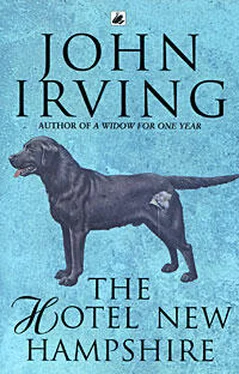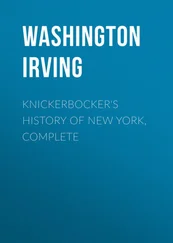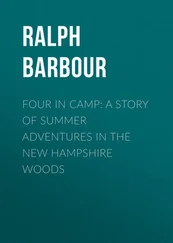John Irving
The Hotel New Hampshire
For my wife Shyla
Whose love provided
The light and the space
For five novels
1
The Bear Called State O’Maine
The summer my father bought the bear, none of us was born—we weren’t even conceived: not Frank, the oldest; not Franny, the loudest; not me, the next; and not the youngest of us, Lilly and Egg. My father and mother were hometown kids who knew each other all their lives, but their “union,” as Frank always called it, hadn’t taken place when Father bought the bear.
“Their ‘union,’ Frank?” Franny used to tease him; although Frank was the oldest, he seemed younger than Franny, to me, and Franny always treated him as if he were a baby. “What you mean, Frank,” Franny said, “is that they hadn’t started screwing.”
They hadn’t consummated their relationship,” said Lilly, one time; although she was younger than any of us, except Egg, Lilly behaved as if she were everyone’s older sister—a habit Franny found irritating.
“‘Consummated’?” Franny said. I don’t remember how old Franny was at the time, but Egg was not old enough to hear talk like this: “Mother and Father simply didn’t discover sex until after the old man got that bear,” Franny said. “That bear gave them the idea—he was such a gross, horny animal, humping trees and playing with himself and trying to rape dogs.”
“He mauled an occasional dog,” Frank said, with disgust. “He didn’t rape dogs.”
“He tried to,” Franny said. “You know the story.”
“ Father’s story,” Lilly would then say, with a disgust slightly different from Frank’s disgust; it was Franny Frank was disgusted with, but Lilly was disgusted with Father.
And so it’s up to me—the middle child, and the least opinionated—to set the record straight, or nearly straight. We were a family whose favourite story was the story of my mother and father’s romance: how Father bought the bear, how Mother and Father fell in love and had, in rapid succession, Frank, Franny, and me (“Bang, Bang, Bang!” as Franny would say); and, after a brief rest, how they then had Lilly and Egg (“Pop and Fizzle,” Franny says). The story we were told as children, and retold to each other when we were growing up, tends to focus on those years we couldn’t have known about and can see now only through our parents’ many versions of the tale. I tend to see my parents in those years more clearly than I see them in the years I actually can remember, because those times I was present, of course, are coloured by the fact that they were up-and-down times—about which I have up-and-down opinions. Toward the famous summer of the bear, and the magic of my mother and father’s courtship, I can allow myself a more consistent point of view.
When Father would stumble in telling us the story—when he would contradict an earlier version, or leave out our favourite parts of the tale—we would shriek at him like violent birds.
“Either you’re lying now or you lied the last time,” Franny (always the harshest of us) would tell him, but Father would shake his head, innocently.
“Don’t you understand?” he would ask us. “You imagine the story better than I remember it.”
“Go get Mother,” Franny would order me, shoving me off the couch. Or else Frank would lift Lilly off his lap and whisper to her, “Go get Mother.” And our mother would be summoned as witness to the story we suspected Father of fabricating.
“Or else you’re leaving out the juicy parts on purpose,” Franny would accuse him, “just because you think Lilly and Egg are too young to hear about all the screwing around.”
“There was no screwing around,” Mother would say. There was not the promiscuity and freedom there is today. If a girl went off and spent the night or weekend with someone, even her peers thought her a tramp or worse; we really didn’t pay much attention to a girl after that. ‘Her kind sticks together,’ we used to say. And ‘Water seeks its own level.’ “ And Franny, whether she was eight or ten or fifteen or twenty-five, would always roll her eyes and elbow me, or tickle me, and whenever I tickled her back she’d holler, “Pervert! Feeling up his own sister!” And whether he was nine or eleven or twenty-one or forty-one, Frank always hated sexual conversations and demonstrations of Franny’s kind; he would say quickly to Father, “Never mind that. What about the motorcycle?”
“No, go on about the sex,” Lilly would tell Mother, very humorlessly, and Franny would stick her tongue in my ear or make a farting noise against my neck.
“Well,” Mother said, “we did not talk freely of sex in mixed company. There was necking and petting, light or heavy; it was usually carried on in cars. There were always secluded areas to park. Lots more dirt roads, of course, fewer people and fewer cars—and cars weren’t compact, then.”
“So you could stretch out,” Franny said.
Mother would frown at Franny and persevere with her version of the times. She was a truthful but boring storyteller—no match for my father—and whenever we called on Mother to verify a version of a story, we regretted it.
“Better to let the old man go on and on,” Franny would say. “Mother’s so serious.” Frank would frown. “Oh, go play with yourself, Frank, you’ll feel better,” Franny would tell him.
But Frank would only frown harder. Then he’d say, “If you’d begin by asking Father about the motorcycle, or something concrete, you’d get a better answer than when you bring up such general things: the clothes, the customs, the sexual habits.”
“Frank, tell us what sex is,” Franny would say, but Father would rescue us all by saying, in his dreamy voice, “I can tell you: it couldn’t have happened today. You may think you have more freedom, but you also have more laws. That bear could not have happened today. He would not have been allowed .” And in that moment we would be silenced, all our bickering suddenly over. When Father talked, even Frank and Franny could be sitting together close enough to touch each other and they wouldn’t fight; I could even be sitting close enough to Franny to feel her hair against my face or her leg against mine, and if Father was talking I wouldn’t think about Franny at all. Lilly would sit deathly still (as only Lilly could) on Frank’s lap. Egg was usually too young to listen, much less understand, but he was a quiet baby. Even Franny could hold him on her lap and he’d be still; whenever I held him on my lap, he fell asleep.
“He was a black bear,” Father said; “he weighed four hundred pounds and was a trifle surly.”
“ Ursus americanus, ” Frank would murmur. “And he was unpredictable.”
“Yes,” Father said, “but good-natured enough, most of the time.”
“He was too old to be a bear anymore,” Franny said, religiously.
That was the line Father usually began with—the line he began with the first time I remember being told the story. “He was too old to be a bear anymore.” I was in my mother’s lap for this version, and I remember how I felt fixed forever to this time and place: Mother’s lap, Franny in Father’s lap beside me, Frank erect and by himself—sitting cross-legged on the shabby oriental with our first family dog, Sorrow (who would one day be put to sleep for his terrible farting). “He was too old to be a bear anymore,” Father began. I looked at Sorrow, a witless and loving Labrador, and he grew on the floor to the size of a bear and then aged, sagging beside Frank in smelly dishevelment, until he was merely a dog again (but Sorrow would never be “merely a dog”).
Читать дальше












